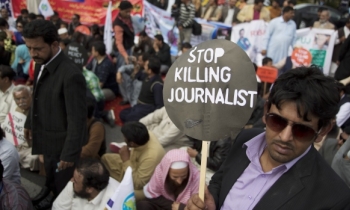Journalists Saodat Omonova and Malohat Eshonkulova were arrested five minutes after they began protesting and brandishing posters outside the presidential administration building in Tashkent June 27, officially celebrated as Day of the Journalist in Uzbekistan.
They were taken to a local police station and then to a municipal court, where they were immediately tried and convicted of staging an unauthorised demonstration under article of 201 of the civil code. The two women, who were fired from a state TV station last December, reacted to their conviction by beginning a hunger strike.
“Omonova and Eshonkulova, who have been denied justice for months, made the mistake of wanting to give some real content to the hollow official celebration of Day of the Journalist by staging a new protest against censorship and judicial bias,” Paris-based press freedom group Reporters sans Frontières (RSF) said.
They were fired from the state-owned TV station Yoshlar in December after demonstrating against censorship and corruption at the station. Dismissing journalists is a particularly effective sanction in a country where the government controls all “authorised” media, as it means they are unlikely to find any other work in journalism. Their dismissal has been followed by a disturbing series of attempts to intimidate them.
After an investigation marked by gross procedural violations, they lost their attempt to sue their former employer for unfair dismissal. The first hearing was suspended on the grounds of an independent journalist’s “illegal” presence in the courtroom. During the final hearing, their lawyer suddenly disappeared inexplicability, but that did not stop the judge from ruling against them. They filed an appeal on June 24.
They were fined around 3 million soms (1,220 euros) at the end of the summary trial on June 27, which will add to their financial difficulties.
“We requested an adjournment of the hearing to allow us to get a lawyer and examine the police report of our alleged offence,” Omonova told RSF. “But they replied that a lawyer was not necessary, that there was no time for that, and that all we had to do was make a statement.”
They are supposed to receive a copy of the verdict within three days and are determined to appeal.
Such a judicial farce is typical is Uzbekistan, which is ranked 163rd out of 178 counties in the latest RSF press freedom index. Journalists are constantly harassed in a variety of ways. The treatment that Omonova and Eshonkulova have received is clearly designed to intimidate other state media journalists who might be tempted to follow their brave example.
The Uzbek authorities often use jail sentences and mistreatment to silence outspoken journalists. Eleven media personnel are currently detained in Uzbekistan in connection with their journalistic activities.









